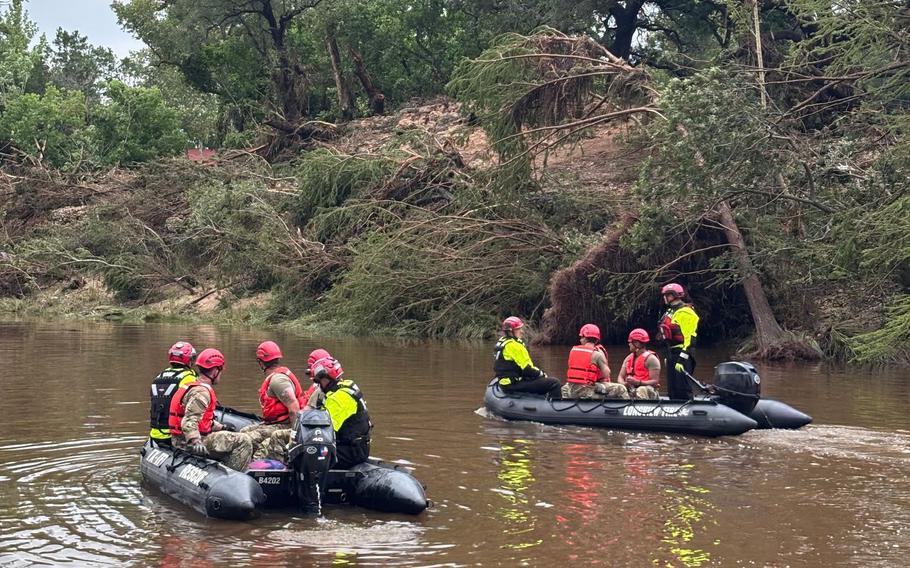
Texas National Guard troops use boats to search for survivors in Kerr County following floods that began in the region on July 4, 2025. (Texas National Guard)
As a retired Army major general, I’ve spent my life focused on one mission: keeping America safe. That’s why I am raising the alarm to my fellow veterans about a new threat — not from a hostile foreign power, but from inside our own government.
The Trump administration’s Environmental Protection Agency has launched an effort to repeal the Endangerment Finding — the bedrock scientific and legal determination that greenhouse gases endanger public health and welfare. This is more than bureaucratic tinkering. It’s an all-out assault on the legal framework that has allowed the U.S. government to confront the climate crisis — and its ripple effects on national security.
The Endangerment Finding, issued in 2009, was not a political opinion. It was the product of rigorous scientific consensus on the threat of climate change. It enabled the federal government to regulate greenhouse gas pollution under the Clean Air Act. Now, under the banner of “unleashing American energy,” this administration wants to pretend the danger doesn’t exist. That’s not just anti-science — it’s anti-security.
What would be ironic if it wasn’t so dangerous is the fact that this proposal could actually curtail energy security and independence. Shutting the door on clean solutions means higher energy prices and more dependence on fossil fuels.
One climate pollutant, methane, is also the primary ingredient of natural gas. In 2023, oil and gas companies vented, flared, or leaked about $3.5 billion worth of natural gas — enough natural gas to meet the residential gas needs (heating and cooking) of 19 million homes. That sounds more like wasting American energy instead of unleashing it — and methane is responsible for about a third of the climate-warming impacts we are already experiencing.
Climate change is a threat multiplier. That’s not just my opinion — it’s the stated position of the Department of Defense, going back decades. Rising sea levels threaten U.S. naval bases. Extreme weather strains National Guard deployments. Drought and displacement fuel global instability and terrorism. When the climate shifts, so do conflict zones — and no one knows this better than American service members as we are sent to the front lines of chaos. Undermining our ability to respond to climate change puts our troops, our bases, and our country at greater risk.
To repeal the Endangerment Finding, the EPA would need to disprove a mountain of scientific evidence, override Massachusetts v. EPA — a U.S. Supreme Court decision — and argue, somehow, that climate pollution is no longer a danger. That argument shouldn’t hold up in court. But the damage done while they try could be catastrophic.
We’ve seen what happens when leaders put politics before facts. From Iraq to Afghanistan to our own Capitol on Jan. 6, ignoring expert warnings leads to disaster. Repealing the Endangerment Finding would be another grave warning ignored.
Veterans swear an oath to defend this country against all enemies, foreign and domestic. That includes threats to our air, our water and our ability to respond to a rapidly changing world. Climate change is real. It is dangerous. And dismantling the very tools we use to fight it weakens our country.
If the EPA succeeds in this repeal, essential safeguards will be undermined, and we will lose hard-won ground in the urgent fight to defend the American people against the worst impacts of climate change. I invite fellow veterans to join me in submitting public comments to stand against this new threat. America’s security depends on it.
Paul Eaton, a retired U.S. Army major general, is a senior adviser to Vet Voice Foundation. He served more than 30 years, including combat and post-combat assignments in Iraq, Bosnia and Somalia. He was assigned to Iraq from 2003 to 2004 as commanding general of the Coalition Military Assistance Training Team, where he designed, manned, trained and equipped the Iraqi armed forces for the Iraqi Ministry of Defense and the security forces for the Interior Ministry. Prior to that assignment, he commanded the Army’s Infantry Center and was Chief of Infantry for the Army.